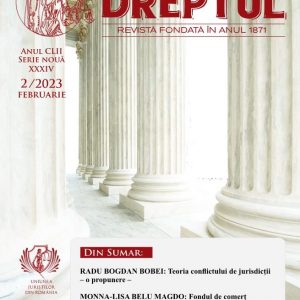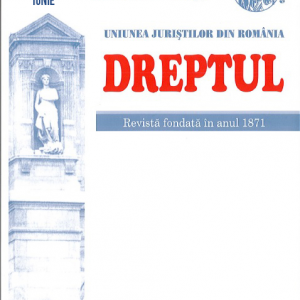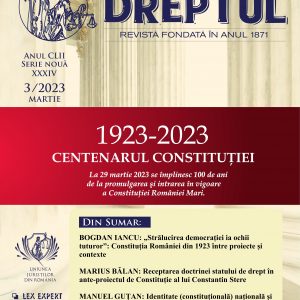-
 In this study - which covers a number of proper approaches on the phenomenon of „political migration” within the Romanian Parliament – the author examines beforehand the role of political groups in establishing the political configuration of parliament, after which she analyzes at large the political migration phenomenon, including regulatory matters (constitutional and statutory), as well as the case law of the Constitutional Court in the matter. Finally, in the conclusions, the author sets forth some of her own views on the phenomenon of „political migration” within the Romanian Parliament, in the context of current political and legal scene of the Romanian State.
In this study - which covers a number of proper approaches on the phenomenon of „political migration” within the Romanian Parliament – the author examines beforehand the role of political groups in establishing the political configuration of parliament, after which she analyzes at large the political migration phenomenon, including regulatory matters (constitutional and statutory), as well as the case law of the Constitutional Court in the matter. Finally, in the conclusions, the author sets forth some of her own views on the phenomenon of „political migration” within the Romanian Parliament, in the context of current political and legal scene of the Romanian State. -
 The purpose of the author’s approach is to determine the real meaning of the contestation for annulment in relation to the other means of appeal regulated in the new Civil Procedure Code. In this respect, the author considers, in full agreement with the current case law and doctrine, that in the processual system in force the contestation for annulment has as a fundamental objective the correction of some procedural mistakes, and not of some substantive errors. In this study additional arguments are presented in favour of the thesis according to which the contestation for annulment regulated by Article 503 (2) point 2 of the new Civil Procedure Code can not have the meaning of envisaging the substantive mistakes, whereas such an approach does not have any support in the provisions of the legislation in force. The author expresses reservations also with regard to the establishment of an extraordinary means of appeal, of the sort of the former extraordinary recourse, which would make possible to remedy some substantive mistakes. In this respect, the author has noted that the trend of modern times is not one that would lead to the multiplication of the means of appeal, as it happened in our country in the last three decades, but to their rationalization and achievement of efficiency. However, an establishment of a new means of appeal could only be discussed in the context of a substantial reform of our judicial system.
The purpose of the author’s approach is to determine the real meaning of the contestation for annulment in relation to the other means of appeal regulated in the new Civil Procedure Code. In this respect, the author considers, in full agreement with the current case law and doctrine, that in the processual system in force the contestation for annulment has as a fundamental objective the correction of some procedural mistakes, and not of some substantive errors. In this study additional arguments are presented in favour of the thesis according to which the contestation for annulment regulated by Article 503 (2) point 2 of the new Civil Procedure Code can not have the meaning of envisaging the substantive mistakes, whereas such an approach does not have any support in the provisions of the legislation in force. The author expresses reservations also with regard to the establishment of an extraordinary means of appeal, of the sort of the former extraordinary recourse, which would make possible to remedy some substantive mistakes. In this respect, the author has noted that the trend of modern times is not one that would lead to the multiplication of the means of appeal, as it happened in our country in the last three decades, but to their rationalization and achievement of efficiency. However, an establishment of a new means of appeal could only be discussed in the context of a substantial reform of our judicial system. -
 In the above study, the author criticizes severely a judgment of the Romanian High Court of Cassation and Justice (the Administrative and Tax Litigations Section), passed on 26 October 2009, explicitly and unequivocally stating that the mentioned court was entitled not to enforce a provision contained in a law in force (namely, art. III of Law no. 262/2009), explaining that the given provision was unconstitutional since it “infringes the right to a fair trial”, although the Constitutional Court of Romania, quite the opposite, had stated the contrary, finding the constitutionality of that legal provision. The author’s criticism focuses on the idea that, according to the Constitution of Romania, only the Constitutional Court is legally competent to give a ruling on the constitutionality/non-constitutionality of a law or a Government ordinance in force (or of any provision included therein), and that the courts (including the High Court of Cassation and Justice) have no such legal jurisdiction in the matter.
In the above study, the author criticizes severely a judgment of the Romanian High Court of Cassation and Justice (the Administrative and Tax Litigations Section), passed on 26 October 2009, explicitly and unequivocally stating that the mentioned court was entitled not to enforce a provision contained in a law in force (namely, art. III of Law no. 262/2009), explaining that the given provision was unconstitutional since it “infringes the right to a fair trial”, although the Constitutional Court of Romania, quite the opposite, had stated the contrary, finding the constitutionality of that legal provision. The author’s criticism focuses on the idea that, according to the Constitution of Romania, only the Constitutional Court is legally competent to give a ruling on the constitutionality/non-constitutionality of a law or a Government ordinance in force (or of any provision included therein), and that the courts (including the High Court of Cassation and Justice) have no such legal jurisdiction in the matter. -
 This article deals with the legal status of founders of a company regulated by Law No 31/1990 in the light of differences between the founders de facto and the founders de jure. The main idea of this article is that, while the law makes various references to persons that acquire rights or benefits as a result of establishing a company without signing the setting up document, this means that such persons acquire, at the same time with the rights, a series of obligations as well. It therefore starts from the interpretation of some legal terms in order to determine which are the conditions in which the persons concerned acquire obligations, including in the light of the (British) comparative law. In conclusion, if the definition of founders de jure is a problem outside any doctrinal debate, the definition of the founders de facto requires some clarifications.
This article deals with the legal status of founders of a company regulated by Law No 31/1990 in the light of differences between the founders de facto and the founders de jure. The main idea of this article is that, while the law makes various references to persons that acquire rights or benefits as a result of establishing a company without signing the setting up document, this means that such persons acquire, at the same time with the rights, a series of obligations as well. It therefore starts from the interpretation of some legal terms in order to determine which are the conditions in which the persons concerned acquire obligations, including in the light of the (British) comparative law. In conclusion, if the definition of founders de jure is a problem outside any doctrinal debate, the definition of the founders de facto requires some clarifications. -

-
 The new Romanian Civil Code contains references to the goodwill, but it does not regulate the legal regime of the goodwill. In the absence of a legal regulation of the goodwill, the legal nature of the goodwill is analysed on the basis of the new conception of the Civil Code concerning the patrimony of the natural person and of the legal person. According to the Civil Code (Article 31), the unique patrimony of the natural or legal person may be subject to a division in the cases and under the conditions provided by law. Allocation patrimonies are the fiduciary patrimonies and those allocated to practicing an authorized profession. In the light of this conception, the goodwill represents an allocation patrimony, namely a distinct fraction of the patrimony of the natural or legal person, intended for conducting the trading activity. Under the terms of the new Civil Code, which admits that the patrimony of a natural or legal person may be subject to a division or an allocation, it is fully justified to qualify the goodwill as „trading patrimony”, a name repudiated in the past.
The new Romanian Civil Code contains references to the goodwill, but it does not regulate the legal regime of the goodwill. In the absence of a legal regulation of the goodwill, the legal nature of the goodwill is analysed on the basis of the new conception of the Civil Code concerning the patrimony of the natural person and of the legal person. According to the Civil Code (Article 31), the unique patrimony of the natural or legal person may be subject to a division in the cases and under the conditions provided by law. Allocation patrimonies are the fiduciary patrimonies and those allocated to practicing an authorized profession. In the light of this conception, the goodwill represents an allocation patrimony, namely a distinct fraction of the patrimony of the natural or legal person, intended for conducting the trading activity. Under the terms of the new Civil Code, which admits that the patrimony of a natural or legal person may be subject to a division or an allocation, it is fully justified to qualify the goodwill as „trading patrimony”, a name repudiated in the past. -
 One condition of the status of repetition of an offence is the existence of the prior final order for conviction to imprisonment for more than 6 months, issued in the case of perpetration of an intentional crime. As regards the calculation of the time when the conviction order becomes final, the substantial criminal law rules shall apply. According to such rules, time shall not be calculated in hours, but only in days, weeks, months and years. Since a day expires at 1200 a.m., the perpetration of a new crime on the date when the previous decision becomes final does not entail the status of repetition of offence for the defendant, but the applicability of the institution of felonies in concert.
One condition of the status of repetition of an offence is the existence of the prior final order for conviction to imprisonment for more than 6 months, issued in the case of perpetration of an intentional crime. As regards the calculation of the time when the conviction order becomes final, the substantial criminal law rules shall apply. According to such rules, time shall not be calculated in hours, but only in days, weeks, months and years. Since a day expires at 1200 a.m., the perpetration of a new crime on the date when the previous decision becomes final does not entail the status of repetition of offence for the defendant, but the applicability of the institution of felonies in concert. -
 Based on the “judges dialogue” concept (institutionalized communication between the judges of various courts and levels of jurisdiction), the above study authors extrapolate this concept by mainly analyzing the forms of this “dialogue” between the 18 existing Constitutional Courts from as many countries of the 28 European Union Member States.
Based on the “judges dialogue” concept (institutionalized communication between the judges of various courts and levels of jurisdiction), the above study authors extrapolate this concept by mainly analyzing the forms of this “dialogue” between the 18 existing Constitutional Courts from as many countries of the 28 European Union Member States. -

-
 Relating to the provisions of the new Civil Code (Law no. 287/2009 republished in „The Official Gazette of Romania”, Part I, no. 505 of July 15, 2011, which was enforced on October 1st, 2011), the author examines in this paper the testament forms, in all respects on which they act. On this occasion, the author shows, on the one hand, that the regulation in question preserves many of the texts of the Civil Code of 1864, whose accuracy and actuality have been denied over time and, on the other hand, that it also establishes some new elements, required urgently by the new social realities. Doing so, Law no. 287/2009 becomes, regarding testament forms, a modern regulation, while the forms no longer used have been removed (such as mystic testament), and new short testament forms have been regulated, with a practical use that cannot be doubted (such as the testament made in case of epidemics, disasters, wars or other such exceptional circumstances, the testament made on board an aircraft, the testament made by the person admitted to a health institution) and expanding the scope of some forms (e.g. testament of amounts and values stored).
Relating to the provisions of the new Civil Code (Law no. 287/2009 republished in „The Official Gazette of Romania”, Part I, no. 505 of July 15, 2011, which was enforced on October 1st, 2011), the author examines in this paper the testament forms, in all respects on which they act. On this occasion, the author shows, on the one hand, that the regulation in question preserves many of the texts of the Civil Code of 1864, whose accuracy and actuality have been denied over time and, on the other hand, that it also establishes some new elements, required urgently by the new social realities. Doing so, Law no. 287/2009 becomes, regarding testament forms, a modern regulation, while the forms no longer used have been removed (such as mystic testament), and new short testament forms have been regulated, with a practical use that cannot be doubted (such as the testament made in case of epidemics, disasters, wars or other such exceptional circumstances, the testament made on board an aircraft, the testament made by the person admitted to a health institution) and expanding the scope of some forms (e.g. testament of amounts and values stored). -
 The authors make an analysis of the Romanian legislation in the matter of forensic reports – and, particularly, in the field of medical malpractice – and they establish that, in these areas, there is a plurality of normative acts of different levels (laws, Government ordinances, Government decisions, orders of ministers), regulations which, quite often, are confused, contradict each other, are incomplete, sometimes they are not correlated with the rules of principle in the matter of evidence included in the current Civil Procedure Code, respectively the Criminal Procedure Code etc. At the end of the analysis, the authors propose the repeal of this entire scattered legislation and the elaboration of a single normative act on the matter (at level of law or of Government ordinance) that, having regard to the current legislative experience, would completely and unitarily bring a modern, unique and unitary regulation with regard to the forensic reports (including those concerning the medical malpractice).
The authors make an analysis of the Romanian legislation in the matter of forensic reports – and, particularly, in the field of medical malpractice – and they establish that, in these areas, there is a plurality of normative acts of different levels (laws, Government ordinances, Government decisions, orders of ministers), regulations which, quite often, are confused, contradict each other, are incomplete, sometimes they are not correlated with the rules of principle in the matter of evidence included in the current Civil Procedure Code, respectively the Criminal Procedure Code etc. At the end of the analysis, the authors propose the repeal of this entire scattered legislation and the elaboration of a single normative act on the matter (at level of law or of Government ordinance) that, having regard to the current legislative experience, would completely and unitarily bring a modern, unique and unitary regulation with regard to the forensic reports (including those concerning the medical malpractice). -

